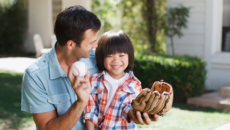Traci was concerned about her 14-year-old son Mac. “He doesn’t have any friends,” she told the school counselor. She described a young man who would make attempts to socialize, but frequently retreated into his bedroom where he pursued solitary activities like playing his guitar. The counselor suggested that the normal adolescent worries about “fitting in” might be complicated for Mac because he was adopted. Traci rejected the idea. “He’s never had any issues about being adopted,” she said.
As Mac’s mother, Traci knows him better than the school counselor, and there are many possible explanations for his behavior. However, the measure of whether a child has issues relating to adoption is not how much the child wants to talk about it. Children can have concerns that they don’t express, even when given the opportunity.
Furthermore, a child who gave his adoption little thought at one stage of development may suddenly become interested at another time. Mac may never have expressed an interest in talking about adoption, but that doesn’t mean he hasn’t thought about or been affected by his experience.
Each of us is affected by the significant events in our life. Many of us do not realize until much later how we were impacted by the death of a sibling, the divorce of our parents, or an incident of violence that we witnessed. It sometimes takes distance, perspective, and healing for us to articulate how we were affected by an event in childhood.
Coming to terms with adoption
Every person who has been adopted must come to terms with the fact that the people who were supposed to take care of him made a decision that they could not take care of him. Every adoptee evaluates whether this affects his worth as a human being or his ability to attract people who will love him and commit to him. Every person who has been adopted thinks about what entitles her to “belong” in her adoptive family when she doesn’t share the family’s biology or history, and when she may have a far different temperament or set of abilities from anyone else in the family.
In other words, every adoptee has “adoption issues.” Adoptees deal with these in different ways at different stages of their lives, depending on their cognitive abilities, their temperament, the ways they are given to explore their adoption, the messages they receive from outside the family, and their own approach to life.
To say an adoptee doesn’t have “adoption issues” is like saying a girl hasn’t been affected by being female, or that an African-American doesn’t have “race issues.” It doesn’t mean the adoptee, the girl, or the African-American is suffering or tormented. It simply means that they must determine how adoption has affected them and to come to terms with it.
- How has the knowledge that he was relinquished affected the adoptee’s sense of self-worth?
- How has the adoptee’s sense of security been affected by knowing that she was once separated from the people she knew as parents?
- Does the adoptee believe she is loveable, even if her birth parents relinquished her?
- Does he believe he can count on people to stay in his life?
Buried feelings
There are several reasons adoptees might not reveal that these adoption issues concern them. These are abstract ideas that some children won’t be able to verbalize. But parents may notice times when their children are acting out or being “clingy.” Asked to explain their behavior, children usually can’t put the reasons into words, even if the cause of the behavior is something that has recently taken place, such as the move to a new school or an argument between their parents. Imagine how much more difficult it is for children to understand feelings caused by an event that they’ve heard about, but that they often can’t even remember.
It’s also important to realize that there are a number of experiences and messages that contribute to a child’s sense of self-esteem and security. For example, all children are fearful that they will lose their parents. Some adoptees have a heightened sense of this fear due to their awareness that they once were separated from their birth parents. However, it’s difficult to tease out the adoption factor from the normal sense of insecurity.
There are other reasons why an adoptee may not indicate his true level of interest in his birth parents or his adoption. An adoptee may be intensely interested, but perhaps believes his adoptive parents would be hurt if he talked about his birth parents. He may have gotten that message from his parents, from a television show, or just arrived at his own conclusions.
He may be like one adoptee who felt angry that her birth parents “didn’t want” her, but didn’t want to admit that people who “didn’t want” her could hurt her. She didn’t want anyone to know how much she cared about people who, in her eyes, clearly didn’t care about her. Or perhaps he’s like the adoptee who had been told he would probably never be able to learn more about his origins. He told himself not to care — and not to question — because he would never learn the answers.
Don’t wait to be asked
We shouldn’t be surprised when children or teenagers or even young adults aren’t anxious to reveal the vulnerabilities that adoption has caused in them. Think about someone you thought of as a very close friend. Perhaps you’d been lifesavers for each other when you first moved to town. She was always available for coffee. You saw her through her divorce. Then she moved away, seldom called, didn’t respond to your holiday letter, and never answered your e-mails.
How hard it is to admit that you were hurt by this. Maybe you made excuses for her. Maybe you pretended she wasn’t that important to you. And if someone said point blank: “Is there anything about your friend Jennifer that you want to talk about?” perhaps you would say, “No, I’m OK with it. I mean, people come and go in your life.” Maybe you wouldn’t even realize that you were not as quick to make friends with the next potential friend because Jennifer had hurt you.
Experiences like that pale in comparison to the losses adopted children have had. How much more difficult it must be for children to recognize and acknowledge the impact of an event that not only was a significant loss, but, for most of them, took place before their conscious memory.
We are expecting a lot of our children if we wait for them to let us know how vulnerable they feel before we respond. Instead, we can use empathy to create a safe environment for our children to express vulnerability — not just about their adoption, but about all their experiences.
We might not respond to the person who asked us if we wanted to talk about our feelings about our friend moving away and not calling. But if someone said, “I’d feel pretty hurt if someone I’d thought of as my friend moved away and never bothered to call,” we know we’ll be understood if we express our hurt.
When parents say to a child, “It must be hard to look in the mirror and not have any idea if you look like someone,” they are letting their children know they aren’t threatened by curiosity about their birth parents. When parents say, “I wonder if you feel hurt when your brother gets a letter from his birth mother and you never hear from yours,” they help their children put words to feelings.
The loss of the people who gave birth to you, and to whom you are biologically and spiritually connected, is a significant event. It can affect everything from a sense of belonging to a sense of personal worth. The issues that adoption raises are important and complicated.
Our children deserve an opportunity to explore and make peace with them, even if doing so is uncomfortable. As parents who have made a commitment to meet their needs, we can’t let our discomfort with these issues serve as excuses for not addressing them. It is our responsibility to create an atmosphere of security and comfort so that our children feel safe exploring all aspects of who they are.

